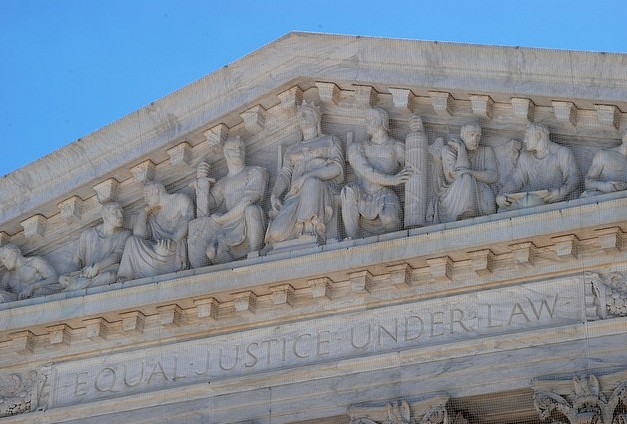Gansler: SCOTUS likely to chip away at reproductive rights in Mississippi case
U.S. Supreme Court facade by Kevin H. with Flickr Creative Commons License
@BryanRenbaum
Former state attorney general and Democratic gubernatorial candidate Doug Gansler predicted that the U.S. Supreme Court will likely weaken or possibly even eliminate federal abortion rights when it renders a decision in a high-profile case challenging the 1973 landmark Roe. v. Wade decision.
On Wednesday, the 6-3 conservative-leaning court is scheduled to hear oral arguments in a case brought by Mississippi. The first real challenge to Roe comes as numerous other states, including Texas and Oklahoma, have recently enacted laws that limit access to abortion.
But even if the high court reverses precedent and strikes down Roe, abortion is almost all but certain to remain legal in liberal-leaning states like Maryland.
“On December 1st, when the Supreme Court hears the Mississippi case, they are not hearing it because they want to rubber stamp Roe v. Wade. They are hearing it because they are either going to overturn Roe v. Wade or significantly scale it back,” Gansler told MarylandReporter.com in a recent interview.
“So who we elect as our next governor is going to have a major impact on women’s reproductive rights in Maryland because it will get kicked back to the states,” Gansler added.
But is Gansler correct? Is the high court likely to gut or scrap Roe entirely?
“I agree. It is not clear whether this will be a situation of ongoing death by a thousand cuts, reducing access to abortion incrementally until the right essentially disappears, or whether the Court will eliminate the right altogether,” Michele Gilman, a professor at the University of Baltimore School of Law, said. “Either way, the result will be harmful for women, particularly low-income women who struggle the most to effectuate their rights even under the current legal landscape.”
Del. Haven Shoemaker, R-Carroll, who also is an attorney, said he believes the high court is unlikely to go as far as overturning Roe.
“Most legal experts are opining that the Court is likely to make a narrower ruling than overturning Roe v. Wade outright. Setting aside 48 years of precedent is never easy.”
Nevertheless, Shoemaker said he hopes his prediction proves wrong and that the high court ultimately does decide to reverse precedent in the case.
“Roe should be overturned because it was wrongly decided in the first place. That decision was the product of judicial activism in which the Court predicated its decision on a right (the right to privacy) which does not appear anywhere in the text of the Constitution. Pre-Roe, abortion law decisions were left to the states, and that is where it ought to be.”
Richard Vatz, a professor of political persuasion at Towson University, said despite the intense politicization surrounding the case the high court is unlikely to pull a surprise and reverse precedent.
“The threats since and before Biden’s election to pack the Court (rhetorically softened to “Expanding the Court”) have newly politicized it, and inferences will be made now about its decisions to hear and decide on cases. The Court rarely (less than 1%) overturns precedent, but there have been few decisions as controversial as Roe v. Wade (e.g., Brown v. Board of Education reversed Plessy v. Ferguson, of course).”
“The most hostile Justice to Roe is likely Clarence Thomas, but other conservative judges are more likely to slightly modify it, per appeals regarding the pain of abortion to the fetus and/or an earlier time limitation for the performance of abortion. Moreover, Chief Justice John G. Roberts, Jr. has had a strong presumption for precedent and not allowing his Court to be known as a conservative or liberal Court,” Vatz added.
Karen J. Nelson, who is the President and CEO of Planned Parenthood of Maryland, said in a statement to MarylandReporter.com that the Mississippi case could very well produce “catastrophic” results.
“While Roe must be protected, it has never been enough on its own to guarantee access for people across the country. In any state, unless there is good insurance coverage and enough trained providers, then access is a concern. Restrictions and bans sow chaos and confusion. It’s up to us to push for bold solutions that ensure abortion is available, affordable, and accessible for anyone who needs it. Abortion justice can’t wait, and it cannot be achieved until every person can make their own decisions about their bodies, their lives, and their futures. We are not complacent in Maryland hoping the courts protect our rights. We are fighting for our communities and taking proactive measures to protect abortion access.”
A recent Washington Post/ABC News poll found that 60% of Americans said they want the high court to uphold Roe, compared with just 27% who said they want the high court to overturn the decision.

MarylandReporter.com is a daily news website produced by journalists committed to making state government as open, transparent, accountable and responsive as possible – in deed, not just in promise. We believe the people who pay for this government are entitled to have their money spent in an efficient and effective way, and that they are entitled to keep as much of their hard-earned dollars as they possibly can.

